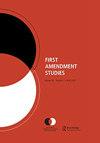占领运动与第一修正案:进退两难
Q2 Social Sciences
引用次数: 0
摘要
过去十年中最有趣的政治发展之一是占领华尔街(OWS)运动的出现。占领华尔街是一场反对美国社会权力和财富集中的运动。它的主要目标是“1%”,这是一群富有的个人和银行组织,他们被描述为制造了金融危机,然后通过政府救助从经济衰退中获利。此外,“百分之一”被占领者视为将工作外包到国外的工具,从而伤害了“努力工作和遵守规则”的人,特别是那些从事蓝领工作的人。后者包括从公司退休或残疾的人,但当公司申请破产时,他们失去了公司提供的养老金。奥弗尔认为,占领华尔街运动是一场运动,“为几十年来一直倾向于让富人比其他人受益的政策的受害者带来了他们急需的声音。”就像20世纪60年代的“争取民主社会学生组织”(SDS)一样,占领华尔街运动没有具体的要求,也没有领导者。他们担心的是日益严重的不平等,他们认为这种不平等伤害了99%的美国公众。与SDS一样,将占领华尔街运动团结起来的似乎是一种反精英、反建制的态度,以及自下而上创建新社会的方法。占领者活动人士阿什利·哈尼斯科说:“我们正在与这种观念作斗争,即如果你不富有,你就是可牺牲的。如果你不富有,那是你自己的错。”华尔街的影响力太大,正在损害国家利益,这是占领华尔街运动的基本原则之一。正如前劳工部长罗伯特·赖希(Robert Reich)所观察到的那样,占领者的核心信息是“社会财富的日益集中对我们的民主构成了巨大的威胁。”就连奥巴马总统也对占领华尔街运动提出的担忧表示赞赏:“抗议者表达了对我们金融部门运作方式的更广泛的不满……美国人民明白,并非所有人都在遵守规则。”本文章由计算机程序翻译,如有差异,请以英文原文为准。
The Occupy Movement and the First Amendment: A Quandary
One of the most interesting political developments of the past decade has been the emergence of the Occupy Wall Street (OWS) movement. OWS is a movement against the concentration of power and wealth in American society. Its chief target is the “One-Percenters,” a group of wealthy individuals and banking organizations depicted as having created a financial crisis and then profiting from the economic downturn through government bailouts. In addition, “One Percenters” are viewed by Occupiers as being instrumental in outsourcing jobs abroad thus hurting people “who work hard and play by the rules,” especially those who hold blue-collar jobs. Among the latter were people who retired from a company or were on disability but who lost their company-funded pensions when the company filed for bankruptcy. Ofer views OWS as a movement “bringing a much-needed voice to the victims of a decades-long march toward policies that benefit the rich over everyone else.” Like Students for a Democratic Society (SDS) during the 1960s, OWS has no concrete demands and no leaders. Their concern is with the growing inequality that they believe harms 99 percent of the American public. As with SDS, what seems to unite the OWS movement is an anti-elitist, anti-establishment attitude, and its bottom-up approach to creating a new society. Said Occupier activist Ashley Hanisko, “We are fighting this idea that you are expendable if you are not wealthy. And if you are not wealthy, it’s through some fault of your own.” The belief that Wall Street has been too influential and is harming the national interest is one of the underlying tenets of the OWS movement. As former Secretary of Labor Robert Reich observed, the core message of the Occupiers is “that the increasing concentration of wealth in society poses a great danger to our democracy.” Even President Obama praised the concerns raised by the OWS movement: “The protesters are giving voice to a more broad-based frustration with how our finance sector works . . . The American people understand that not everybody’s been following the rules.”
求助全文
通过发布文献求助,成功后即可免费获取论文全文。
去求助
来源期刊

First Amendment Studies
Social Sciences-Law
自引率
0.00%
发文量
0
期刊介绍:
First Amendment Studies publishes original scholarship on all aspects of free speech and embraces the full range of critical, historical, empirical, and descriptive methodologies. First Amendment Studies welcomes scholarship addressing areas including but not limited to: • doctrinal analysis of international and national free speech law and legislation • rhetorical analysis of cases and judicial rhetoric • theoretical and cultural issues related to free speech • the role of free speech in a wide variety of contexts (e.g., organizations, popular culture, traditional and new media).
 求助内容:
求助内容: 应助结果提醒方式:
应助结果提醒方式:


